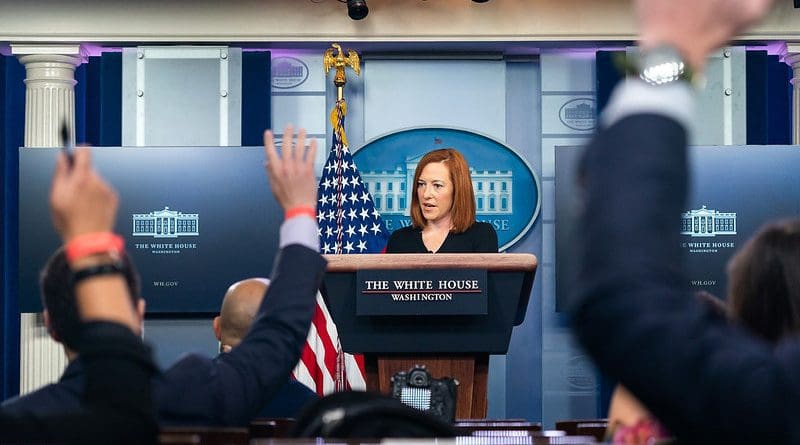Jen Psaki’s Build Back Better Inflation Lie – OpEd
By Andrew Moran*
White House Press Secretary Jen Psaki made quite the fib in a press briefing, claiming that “no economist out there is projecting that this will have a negative impact on inflation.” Of course, Psaki is referring to President Joe Biden’s $1.75 trillion climate change and social policy Build Back Better Act (BBBA). The Congressional Budget Office (CBO) recently confirmed that the public policy will face a $367 billion shortfall and could add $2.5 trillion to the debt if many of the sunset provisions are extended by future sessions of Congress.
Psaki also claimed that the BBBA would alleviate inflation pressures, despite arguing that inflation was not on the horizon earlier this year. But her main point was that “no economist” had questioned the inflationary effects of the Democrats’ piece of legislation. Is this even accurate?
Phooey. Indeed, several well-known economists are ringing the inflation alarm bells. Steven Hanke, the eminent professor of applied economics at John Hopkins University, told RealClearPolitics that “they’re all wrong,” adding that inflation is soaring because “the money supply which has increased by over 35% since COVID, an unprecedented explosion since World War II.”
Mark Zandi at Moody’s Analytics, Douglas Holtz-Eakin of the American Action Forum (AAF), and Harvard University professor Doug Elmendorf – all senior economists – agreed that BBBA will push up inflation in 2022. But there was some disagreement of the amount of inflation that it would trigger. “We may get some growth,” Holtz-Eakin averred. “But we don’t avoid some additional pressure on inflation.”
As Liberty Nation noted, one of the chief problems with the initiative is that a considerable portion of the $1.75 trillion spending blitzkrieg is front-loaded. This means that around 40% of the expenditures will be pumped into the economy. While this might stimulate the gross domestic product and potentially create jobs, it will certainly add to inflation woes. Plus, considering that the measure will be short by hundreds of billions of dollars, the money will need to be printed or borrowed.
Hillary Clinton: Crypto Could Destabilize The World
Hillary Clinton, the former Secretary of State and destroyer of worlds who will never become president, has offered her take on cryptocurrencies, proving that she remains the statist of all statists.
Speaking at the Bloomberg New Economy Forum in Singapore on Nov. 19, the two-time presidential candidate complained crypto has the power to destroy countries and threaten the U.S. dollar’s international reserve currency status. She believes that “asymmetric power centers” buoyed by technology could sabotage governments by facilitating “disinformation, artificial intelligence, and the rise of cryptocurrency.”
“One more area that I hope nation-states start paying greater attention to is the rise of cryptocurrency – because what looks like a very interesting and somewhat exotic effort to literally mine new coins in order to trade with them has the potential for undermining currencies, for undermining the role of the dollar as the reserve currency, for destabilizing nations, perhaps starting with small ones but going much larger.”
Wait a minute. Is Clinton suggesting this is a bad thing? This is likely her intention, but there is nothing necessarily wrong with blockchains, crypto, and smart contracts bringing the global establishment to its knees, although this is quite unlikely to occur. Still, it is surprising that Clinton did not blame Bitcoin for shattering her White House dreams.
Turkey Comes To A Boil As Lira Crashes Again
The Turkish lira cratered to fresh record lows against the U.S. dollar and the euro this week. The lira, one of the worst-performing currencies in the global foreign exchange markets, is on the cusp of annihilation as the USD/TRY and EUR/TRY currency pairs advanced 13%: 11.3208 and 12.8232, respectively.
Investors sold the lira on the central bank slashing interest rates in the middle of an inflationary crisis. Policymakers cut the benchmark one-week repo auction rate by 100 basis points to 15%. The overnight borrowing rate was reduced to 13.5%, while the overnight lending rate was lowered to 16.5%. A 300-basis-point U-turn to the good old days of spring 2021 will not happen.
This comes as Turkey’s annual inflation rate surged to nearly 20% and the producer price index (PPI) topped 46%. Ankara’s only ray of hope is that forex reserves have been recovering, staying above $80 billion for eight consecutive weeks. But does this matter when a currency crisis intensifies?
President Recep Tayyip Erdogan’s unorthodox monetary policy will remain intact, defending the strategy as a means to support the population that has been “crushed by interest rates.” He told lawmakers in parliament that “I cannot and will not stand on this path with those who defend interest rates.” However, market analysts warn that easing policy and currency dilution would seriously damage the Turkish economy.
*About the author: Economics Correspondent at LibertyNation.com. Andrew has written extensively on economics, business, and political subjects for the last decade. He also writes about economics at Economic Collapse News and commodities at EarnForex.com. He is the author of “The War on Cash.” You can learn more at AndrewMoran.net.
Source: This article was published by Liberty Nation

